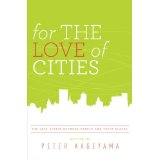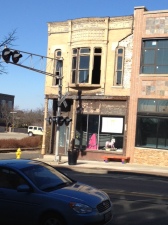 “…openness is synonymous with opportunity; the opportunity to make a difference, make changes, to create something different, unusual or untried and push it into the consciousness of the community.”, Peter Kageyama, 2011.
“…openness is synonymous with opportunity; the opportunity to make a difference, make changes, to create something different, unusual or untried and push it into the consciousness of the community.”, Peter Kageyama, 2011.
I recommend anyone who hopes to see positive changes in their city read Peter Kageyama’s, For the Love of Cities (www.fortheloveofcities.com ). In his book, Peter discusses several of his theories and observations about cities and their ability to survive into the 21st Century. The first of his observations that I wish to discuss is his concept of the “meaning seeker” and the “meaningful city”.
According to Peter (and I concur) young, talented workers (some older ones too) want to make a difference. They are well-educated and creative and they want to know that what they do matters. “They are mission driven, meaning-maximizing people that create things”. Self-actualization, the highest point on Maslow’s hierarchy of needs is what they are striving for. These people are attracted to cities that allow their citizens to utilize their creative ideas for the benefit of the community and support those ideas. According to Peter these “meaning seeking” individuals can reinvent rustbelt cities for very little cost to the city itself, but can rustbelt cities be meaningful cities?
What makes a meaningful city? According to Peter, the meaningful city is one that allows people to get involved and become co-creators in areas that these people find rewarding. Many of the rust-belt cities are in dire need of these “meaning seekers” because these are the innovators, entrepreneurs and creative types that can resurrect a city from its own ashes. What I generally refer to in this blog as creatives. Unfortunately, in many places, especially rustbelt cities, leadership, those empowered to support these types are what Jane Jacobs in her Death and Life of Great American Cities refers to as “squelchers” (also see Peter’s book). They deliberately try to limit the “meaning seekers” attempts to better the city because they “would prefer control and predictability to the open possibility of something new and different.” They de-motivate the co-creators, or in some cases actually drive them out. So is it really the lack of jobs that creates brain-drain and drives young, well- educated people away from these rustbelt cities or are they simply attracted to places where they feel they are more accepted and can contribute more?
I believe that in rustbelt cities there is a historical “norm” that is behind this “squelching” of “meaning seekers”. Since early in the last century, wealthy industrialist sat at the top of the “leadership pyramid” – for lack of a better word – and this very small group of individuals made most, if not all of the decisions for the community as well as the major manufacturing plants that they owned and operated. In most major rustbelt cities at least 50% or more of the labor force was employed in manufacturing even up to the early 80’s and beyond. Those at the top of the “leadership pyramid” even made sure that the educational systems were designed to supply factory workers for their plants, and now many of these cities also have some of the worst school systems in the country. The “leaders” were not interested in creating a huge labor force of well-educated people when they needed them to do nothing but stand on an assembly line all day. Creativity was not fostered. People having meaningful lives did not take precedence over the mass production of goods.
Fast forwarding to today, you will see that the number of manufacturing jobs has dropped exponentially in most of these cities and most, if not all, of the company headquarters are gone. In the absence of these once wealthy industrialists, a few individuals have moved into leadership roles within these communities and still believe that the best way to implement policy is with a few individuals (including themselves of course) making all the decisions – for the most part these individuals are not co-creators and they often refer to their “ideas” as best-practices and encourage a “single vision” – theirs of course. Co-creators, “meaning seekers”, that are looking to make a difference are squelched so that the power structure that supports squelchers is not jeopardized. Original thought and creative ideas are not fostered.
Unfortunately, this philosophy is denying rustbelt cities the opportunity to attract some really excellent talent and ideas; because they are undermining the efforts of those that could really make a difference. Although citizens are shocked at the growing poverty levels and staggering unemployment rates nothing is being done. The young people do not return after college and populations are aging. There is little innovation and economic development efforts based on old concepts are not working. Companies that depend on these young co-creators to thrive are unable to find talented people to move to these cities and take the jobs.
The saddest part is that supporting co-creators and their work (back to Peter’s theories) is not as much of an effort as one might think. What these talented and mission-driven individuals need is the permission – if you will – to create and grow their ideas uninhibited. Leadership need merely recognize a project with a simple compliment and then get out of the way as the co-creator manifests their idea. These co-creators are what will save cities that have the foresight to understand them and support them.
To answer my original question, no, I do not believe that Rockford is a meaningful city. The next question then, is can it become one? Your comments are always welcome.
 In my last post, I mentioned that while I was downtown Springfield I noticed how clean all the windows were. I came back to Rockford the next week and I was amazed at how few business and building owners wash their windows. Those that do are so vibrant and look so appealing with so little effort. Just wash the windows.
In my last post, I mentioned that while I was downtown Springfield I noticed how clean all the windows were. I came back to Rockford the next week and I was amazed at how few business and building owners wash their windows. Those that do are so vibrant and look so appealing with so little effort. Just wash the windows.



